Gujarat Board GSEB Solutions Class 7 Sanskrit Chapter 4 हास्ययोगः Textbook Exercise Important Questions and Answers, Notes Pdf.
Gujarat Board Textbook Solutions Class 7 Sanskrit Chapter 4 हास्ययोगः
GSEB Solutions Class 7 Sanskrit हास्ययोगः Textbook Questions and Answers
हास्ययोगः સ્વાધ્યાયના પ્રસ્નોત્તર Exercise
1. Pronounce the following words orally:
નીચેના શબ્દોનું મોટેથી ઉચ્ચારણ કરો:
आपणिकः, क्रीणातु, पञ्चाशत्, दृष्ट्वा, गृहपाठलेखनम्, श्वानभयम्, दशनस्वभावः, परीक्षणम्, चोरद्वयम्, लुण्ठनम्, रूप्यकाणि, आगत्य, व्यर्थश्रमम्, कृत्रिमदन्तावलिः
(Speak these words three times in clear and correct pronunciation under the guidance of your Sanskrit teacher.)
(તમારા સંસ્કૃત શિક્ષકના માર્ગદર્શન હેઠળ આ શબ્દોનું સ્પષ્ટ અને શુદ્ધ ઉચ્ચારણ ત્રણ વાર કરો.)
![]()
2. Read Sanskrit words for the following Sentences :
નીચેના શબ્દો માટેના સંસ્કૃત શબ્દો શોધોઃ
- खरीदी – purchase – ખરીદી
- बैंक – bank – બૅન્ક
- लूंट – robbery – લૂંટ
- प्रतिशत – percent – ટકા
- दुकानदार – shopkeeper – દુકાનદાર
Answer:
- क्रयः, क्रयणम्
- वित्तकोषः, वित्तकोषम्, (वित्तकोशः, वित्तकोशम्)
- लुण्ठनम्
- प्रतिशतम्
- आपणिकः
3. Write, who speaks the following sentences :
નીચેનાં વાક્યો કોણ બોલે છે તે કહો?
प्रश्न 1.
तर्हि कृपया द्वे यन्त्रे ददातु ।
Answer:
ग्राहकः आपणिकं वदति।
प्रश्न 2.
भवतः गृहकार्ये बहवः दोषाः।
Answer:
शिक्षकः छात्रं वदति ।
प्रश्न 3.
श्वानभयं न अनुभवतु।
Answer:
गृहस्वामी अतिथिं वदति ।
प्रश्न 4.
व्यर्थश्रमं मा करोतु।
Answer:
द्वितीयः चोरः प्रथमं चोरं वदति।
4. Replace the underlined words with those given in the brackets and frame other sentences :
રેખાંકિત પદોના સ્થાને કસમાં આપેલ શબ્દોનો ઉપયોગ કરી અન્ય વાક્યો બનાવો.
- एतत् यन्त्रं क्रीणातु। (फेनकम्, पुस्तकम्, फलम्)
- सा भोजनं करोति। (दुग्धपानम्, दानम्, प्रार्थनाम्)
- व्यर्थश्रमं मा करोतु। (व्यर्थव्यवहारम्, दुर्व्यवहारम्, व्यर्थव्ययम्)
- श्वानभयं न अनुभवतु। (चोरभयम्, सिंहभयम्, अन्धकारभयम्)
प्रश्न 1.
एतत् यन्त्रं क्रीणातु। (फेनकम्, पुस्तकम्, फलम्)
Answer:
एतत् फेनकं क्रीणातु । (Buy this soap.) (આ સાબુ ખરીદો.)
एतत् पुस्तकं क्रीणातु। (Buy this book.) (આ પુસ્તક ખરીદો.)
एतत् फलं क्रीणातु। (Buy this fruits.) (આ ફળ ખરીદો.)
प्रश्न 2.
सा भोजनं करोति। (दुग्धपानम्, दानम्, प्रार्थनाम्)
Answer:
सा दुग्धपानं करोति। (He drinks milk.) (તેણી દૂધ પીએ છે.)
सा दानं करोति। (He gives donation.) (તેણી દાન કરે છે.)
सा प्रार्थनां करोति। (He prays.) (તેણી પ્રાર્થના કરે છે.)
प्रश्न 3.
व्यर्थश्रमं मा करोतु। (व्यर्थव्यवहारम्, दुर्व्यवहारम्, व्यर्थव्ययम्)
Answer:
व्यर्थव्यवहारं मा करोतु। (Don’t do useless dealing.) (ખોટો વ્યવહાર ન કરો.)
दुर्व्यवहारं मा करोतु । (Don’t behave badly.) (ખરાબ વ્યવહાર ન કરો.)
व्यर्थव्ययं मा करोतु । (Don’t waste money.) (ખોટો ખર્ચ ન કરો.)
प्रश्न 4.
श्वानभयं न अनुभवतु। (चोरभयम्, सिंहभयम्, अन्धकारभयम्)
Answer:
चोरभयं न अनुभवतु। (Don’t afraid of a thief.) (ચોરની બીક ન રાખો.)
सिंहभयं न अनुभवतु । (Don’t afraid of a lion.) (સિહની બીક ન રાખો.)
अन्धकारभयं न अनुभवतु । (Don’t afraid of darkness.) (અંધારાની બીક ન રાખો.)
5. Frame sentences. Follow the illustration :
ઉદાહરણ મુજબ વાક્યરચના કરો:
Example:
- एतत् _____________ _____________ अस्ति। (यन्त्रम्, क्रयणम्)
Answer:
एतत् यन्त्रं क्रयणयोग्यम् अस्ति।
प्रश्न 1.
एतत् _____________ _____________ अस्ति। (पुस्तकम्, पठनम्)
Answer:
एतत् पुस्तकं पठनयोग्यम् अस्ति।
प्रश्न 2.
एतत् _____________ _____________ अस्ति। (स्थानम्, भ्रमणम्)
Answer:
एतत् स्थानं भ्रमणयोग्यम् अस्ति।
प्रश्न 3.
एतत् _____________ _____________ अस्ति। (चलचित्रम्, दर्शनम्)
Answer:
एतत् चलचित्रं दर्शनयोग्यम् अस्ति ।
प्रश्न 4.
एतत् _____________ _____________ अस्ति। (जलम्, स्नानम्)
Answer:
एतत् जलं स्नानयोग्यम् अस्ति।
6. Change forms of verbs. Follow the illustration :
ઉદાહરણ મુજબ ક્રિયાપદોમાં પરિવર્તન કરો:
(Change the verbs of the present tense, third-person singular into simple future tense, third-person singular and first-person singular.)
(વર્તમાનકાળ, અન્ય પુરુષ એકવચનનાં ક્રિયાપદોને સામાન્ય ભવિષ્યકાળ, અન્ય પુરુષ એકવચન તથા ઉત્તમ પુરુષ એકવચનનાં ક્રિયાપદોમાં બદલો.)
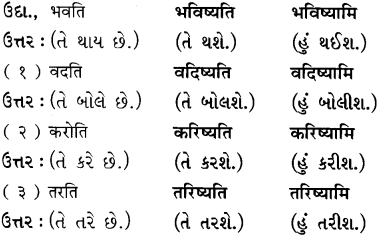
भवति – भविष्यति – भविष्यामि
वदति – _________________ _________________
करोति – _________________ _________________
तरति – _________________ _________________
Example :
- भवति – भविष्यति – भविष्यामि
Answer:
(He becomes.) – (He will be.) – (I will be.)
प्रश्न 1.
वदति – वदिष्यति – वदिष्यामि
Answer:
(He speaks.) – (He will speak.) – (I will speak.)
प्रश्न 2.
करोति – करिष्यति – करिष्यामि
Answer:
(He does.) – (He will do.) – (I will do.)
प्रश्न 3.
तरति – तरिष्यति – तरिष्यामि
Answer:
(He swims.) – (He will swim.) – (I will swim.)
7. Find out such jokes:
આવી બીજી હાસ્યકણિકાઓ શોધો.
उत्तर:
Such other jokes :
हसाम! (Let’s laugh!)
1. “मम शुनकः कुत्रापि अदृश्यतां गतः।”
(“My dog is lost somewhere.”)
“एवम् ! तर्हि पत्रिकायां विज्ञापिकां प्रकाशयतु भवान् एतद्विषये।”
“Oh! ‘then print the news in newspaper.”
“किम् तेन? मम शुनकः पठितुं न जानाति।”
“So what? My dog doesn’t know to read.”
2. शिक्षकः वर्गे छात्रान् अपृच्छत् – “गृहे पिपीलिकानाम् उपस्थितिः भवति तर्हि अस्माकं कः लाभः?”
The teacher asked students in the class, What benefits do we have when the ants come in the house?
रमण : – महोदय ! पिपीलिकाः अस्मान् दर्शयन्ति यत् गृहे मिष्टान्नं कुत्र स्थापितमस्ति।
Raman : Sir, ants show us where the sweets are kept in the house.
3. पिता – (पुत्रं प्रति) सर्वकारीविद्यालयस्य शिक्षकस्य आङ्गलभाषायां नाम किम् अस्ति?
Father – (To his son) What is the English name of Government School Teacher ?
पुत्र – G.S.T.
Son – G.S.T.
पिता – (क्रोधेन) किं वदसि त्वम्?
Father – (Angrily) What are you speaking ?
पुत्रः- सत्यं वदामि ‘Government School Teacher’ इति।
Son – I am speaking true, Government School Teacher.
4. वैद्यः – (रुग्णम् उद्दिश्य) दीर्घ श्वासं स्वीकृत्य त्रिवारं ‘सप्त’ वदतु।
Doctor : (To the patient) Take long breathe and speak ‘seven’ three times.
रुग्णः – (दीर्घ श्वासं स्वीकृत्य) एकविंशतिः।
Patient : (Taking long breathe) Twenty-one.
Sanskrit Digest Std 7 GSEB हास्ययोगः Important Questions and Answers
1. Answer each of the following questions in one sentence in Sanskrit :
प्रश्न 1.
आपणिकः ग्राहकं प्रति किं वदति?
उत्तर:
आपणिकः ग्राहकं प्रति वदति, “एतत् यन्त्रं क्रीणातु क्रयणयोग्यम् अस्ति।”
प्रश्न 2.
यन्त्रस्य का विशेषता अस्ति?
उत्तर:
यन्त्रं ग्राहकस्य पञ्चाशत् प्रतिशतं कार्यभारम् अल्पं करोति, एतत् तस्य विशेषता अस्ति।
प्रश्न 3.
द्वितीयः चौरः प्रथमं चौरं किं वदति?
उत्तर:
द्वितीयः चौरः प्रथमं चौरं वदति, “व्यर्थश्रमं मा करोतु। श्वः वर्तमानपत्रे वार्ताम् आगमिष्यति एव। ततः गणनाज्ञानं भविष्यति।
प्रश्न 4.
अतिथिः कस्मात् भयम् अनुभवति?
उत्तर:
अतिथिः श्वानात् भयम् अनुभवति।
प्रश्न 5.
शम्भुनाथस्य पत्नी तस्य भोजनस्य पश्चात् किमर्थं भोजनं करोति?
उत्तर:
शम्भुनाथस्य पत्नी तस्य भोजनस्य पश्चात् भोजनं करोति, यतः तयोः एका एव कृत्रिमदन्तावलिः अस्ति।
2. Answer each of the following questions in one sentence in English:
Question 1.
What is the specialty in machine ?
યંત્રમાં શી વિશેષતા છે?
Answer:
The machine will lessen work load of customers (people) by fifty percent.
યંત્ર (મશીન) ગ્રાહકોનો (લોકોનો) પચાસ ટકા કામનો બોજો ઓછો કરે છે.
Question 2.
What does the teacher say after seeing the student’s homework ?
શિક્ષક વિદ્યાર્થીનું ગૃહકાર્ય જોઈને શું કહે છે?
Answer:
After checking the student’s homework, the teacher says, there are many mistakes in your homework. Only you do these (mistakes).
શિક્ષક વિદ્યાર્થીનું ગૃહકાર્ય જોઈને કહે છે કે, તમારા ગૃહકાર્યમાં ઘણી ભૂલો છે. તે (ભૂલો) પણ તમે એકલા જ કરો છો.
Question 3.
Why does the owner of the house ask the guest not to be afraid of dog ?
ઘરનો માલિક શા માટે કૂતરાનો ભય ન રાખવાનું કહે છે?
Answer:
The owner of the house asks the guest not to be afraid of dog, because it will be the test of its nature now whether it bites or not.
ઘરનો માલિક કૂતરાનો ભય ન રાખવાનું કહે છે, કારણ કે કૂતરાનો કરવાનો સ્વભાવ છે કે નહિ તેની પરીક્ષા હવે થશે.
Question 4.
Why is the first thief counting money ?
પહેલો ચોર શા માટે પૈસાની ગણતરી કરે છે?
Answer:
The first thief is counting money because he wants to know how much money they have got.
પહેલો ચોર કેટલા પૈસા મળ્યા તે જાણવા માટે પૈસાની ગણતરી કરે છે.
Question 5.
Why does Shambhunath’s wife take dinner after he takes his dinner ?
શંભુનાથના પત્ની તેમના પતિના ભોજન કર્યા પછી જ શા માટે ભોજન કરે છે?
Answer:
Shambhunath’s wife takes dinner after he takes his dinner because they both have only one denture.
શંભુનાથના પત્ની તેમના પતિના ભોજન કર્યા પછી જ ભોજન કરે છે. કેમ કે તેઓ પતિ-પત્ની વચ્ચે એક જ કૃત્રિમ દાંતનું ચોકઠું છે.
3. Choose the correct option for the answer of each of the given questions :
Question 1.
यन्त्रं कीदृशम् अस्ति?
A. विक्रीयोग्यम्
B. क्रयणयोग्यम्
C. सुन्दरम्
D. दृढं विशिष्टं च
उत्तर:
B. क्रयणयोग्यम्
Question 2.
ग्राहकः कतिपयानि यन्त्राणि याचते?
A. एकं यन्त्रम्
B. त्रीणि यन्त्राणि
C. द्वे यन्त्रे
D. पञ्च यन्त्राणि
उत्तर:
C. द्वे यन्त्रे
Question 3.
छात्रस्य गृहकार्ये शिक्षकः किं पश्यति?
A. एकं दोषम्
B. द्वौ दोषौ
C. बहून् दोषान्
D. अशुद्धं लेखनम्
उत्तर:
C. बहून् दोषान्
Question 4.
गृहपाठलेखने छात्रस्य ……………………………. अपि सहायतां करोति। – रिक्तस्थाने उचितं पदं किम्?
A. मित्रम्
B. माता
C. पितामहः
D. पिता
उत्तर:
D. पिता
Question 5.
चौरद्वयं कुत्र लुण्ठनं करोति?
A. धनिकगृहे
B. राजप्रासादे
C. धनभाण्डारे
D. वित्तकोषे
उत्तर:
D. वित्तकोषे
Question 6.
……………………………. वर्तमानपत्रे वार्ता आगमिष्यति एव। – रिक्तस्थाने उचितः शब्दः कः?
A. अद्य
B. ह्यः
C. श्वः
D. एकदा
उत्तर:
C. श्वः
Question 7.
शम्भुनाथस्य पत्नी तस्य भोजनस्य ……………………………. एव भोजनं करोति। – रिक्तस्थाने उचितः शब्दः कः?
A. पश्चात्
B. प्रति
C. पूर्वम्
D. मध्ये
उत्तर:
A. पश्चात्
Question 8.
Find the Sanskrit word for the ‘Bank’.
A. प्रतिशतम्
B. विपणिः
C. वित्तम्
D. वित्तकोषः
उत्तर:
D. वित्तकोषः
Question 9.
What is the meaning of word ‘लुण्ठनम्’ ?
A. Percentage
B. Robbery
C. Bank
D. Theft
उत्तर:
B. Robbery
Question 10.
‘व्यर्थश्रमं मा करोतु।’ – Who says this sentence ?
A. आपणिकः
B. प्रथमः चोरः
C. द्वितीयः चोरः
D. शिक्षकः
उत्तर:
C. द्वितीयः चोरः
4. Fill in the blanks by selecting proper words from the brackets:
- आपणिकः- (ग्राहकं प्रति) एतत् यन्त्रं …………………………
- तर्हि ………………………… द्वे यन्त्रे ददातु।
- गृहपाठलेखने मम पिता अपि ………………………… करोति।
- एतस्य स्वभावस्य परीक्षणम् ………………………… भविष्यति।
- श्वः ………………………… वार्ताम् आगमिष्यति एव।
- आवयोः एका एव ………………………… अस्ति।
उत्तर:
- क्रीणातु
- कृपया
- सहायतां / सहायताम्
- अधुना
- वर्तमानपत्रे
- कृत्रिमदन्तावलिः
5. Put a v against the true statement and a against the false statement :
- एतत् यन्त्रं ग्रहणयोग्यम् अस्ति।
- सर्वान् दोषान् छात्रः एकः एव करोति।
- अतिथिः श्वानभयम् अनुभवति।
- एकः चोरः वित्तकोषे चौर्यं करोति।
- शम्भुनाथः पन्या सह भोजनं न करोति।
6. Pronounce the following words clearly and write English meaning:
- आपणिकः – …………………………
- क्रीणातु – …………………………
- पञ्चाशत् – …………………………
- दृष्ट्वा – …………………………
- दंशनस्वभावः – …………………………
- चौरद्वयम् – …………………………
- आगत्य – …………………………
- कृत्रिमदन्तावलिः – …………………………
- प्रतिशतम् – …………………………
- परीक्षणम् – …………………………
उत्तर:
- Shopkeeper
- Buy
- Fifty
- See
- Biting nature
- Two thieves
- Having come
- Artificial denture
- Percent
- Test
7. Find the Sanskrit meaning of following English words from the lesson and write :
- Buying = क्रयणम्
- Bank = वित्तकोषः
- Robbery = लुण्ठनम्
- Percent = प्रतिशतम्
- Shopkeeper = आपणिकः
- Less = अल्पम्
- Then = पश्चात्, ततः
- Newspaper = वर्तमानपत्रम्
8. Translate the following sentences in Sanskrit and write in your notebook properly :
- Then please give me two machines.
- My father also helps me in doing my homework.
- Please welcome. Don’t be afraid of the dog.
- I am counting money because I want to know how much money we have got.
- My wife takes dinner only after take my dinner.
उत्तर:
- तर्हि कृपया द्वे यन्त्रे ददातु।
- गृहपाठलेखने मम पिता अपि सहायतां करोति।
- भवान् आगच्छतु। श्वानभयं न अनुभवतु।
- कियत् धनं प्राप्तं तस्य ज्ञानार्थं धनगणनां करोमि।
- मम पत्नी (भार्या) मम भोजनस्य पश्चात् एव भोजनं करोति।
9. Write synonyms of the Sanskrit words :
- अल्पम् = न्यूनम्
- कृपा = करुणा, दया
- छात्रः = विद्यार्थी
- दृष्ट्वा = ईक्षित्वा
- सहायता = साहाय्यम्
- पिता = जनकः
- श्वानः = कुक्कुरः
- स्वभावः = प्रकृतिः
- चोरः = चौरः, स्तेनः
- गृहम् = भवनम्, सदनम्
10. Write opposite Sanskrit words :
- क्रयः ✗ विक्रयः
- योग्यम् ✗ अयोग्यम्
- अल्पम् ✗ अनल्पम्, प्रभूतम्
- दोषाः ✗ गुणाः
- उदयः ✗ अस्तः
- भयम् ✗ अभयम्
- अधुना ✗ पश्चात्
- प्राप्तम् ✗ अप्राप्तम्
- व्यर्थम् ✗ सार्थकम्
- श्वः ✗ ह्यः, अद्य
- ज्ञानम् ✗ अज्ञानम्
ज्ञातव्यम् (Fit to be Known)
(The names of twelve fruits in Sanskrit have been given here. Read them with correct pronunciation again and again.)
- आम्रम्, आम्रफलम् – mango
- सीताफलम् – custard-apple
- बदरिका – berry
- सेवम् – apple
- जम्बूफलम् – rose-apple, jamun
- दाडिमम् – pomegranate
- कदलीफलम् – banana
- नारङ्गम् – orange
- आमलकम् – hog-plum
- निम्बूकम् – lemon
- खबूंजः- watermelon
- नारिकेलम् – coconut
हास्ययोगः Summary in English
To create interest in language funny stories, jokes, etc. are very useful. In this chapter, we have tried to make the language-education easy by some humorous jokes.

Picture 1
Glossary :
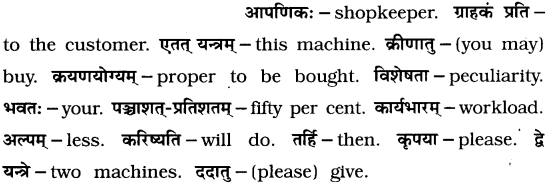
Translation : The shopkeeper – (to the customer) Buy this machine. It is proper to be bought.
The customer – What is its speciality ?
The shopkeeper – This machine will lessen your workload by fifty per cent.
The customer – Then please give me two machines.

Picture 2
Glossary :
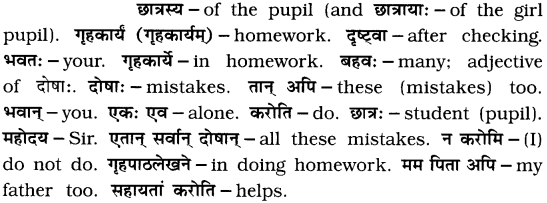
Translation: The teacher – (after checking the student’s homework) There are many mistakes in your homework. only you do these (mistakes).
The student – Sir! I alone do not make all these mistakes. My father also helps me in doing my homework.

Picture 3
Glossary :
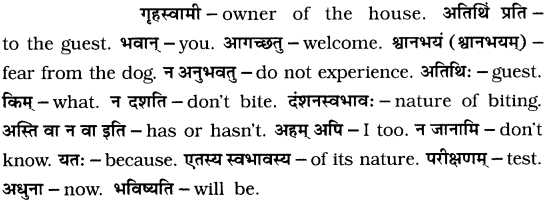
Translation : The owner of the house – (to the guest) Please welcome. Don’t be afraid of the dog.
The guest – Does not it bite ?
The owner of the house – I don’t know whether it has or hasn’t nature of biting, because it will be the test of its nature now.
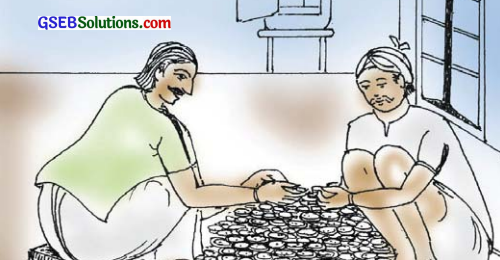
Picture 4
Glossary :
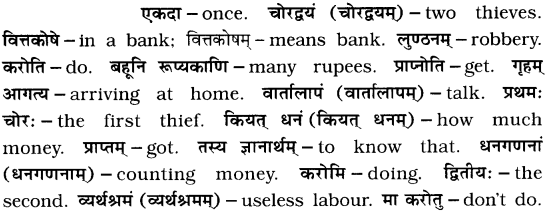

Translation : Once two thieves rob a bank. They get many rupees. Having come home, they talk.
The first thief – I am counting money because I want to know how much money we have got.
The second thief – Don’t do useless labour. The news will come in the newspaper tomorrow. So we shall know counting

Picture 5
Glossary :

Translation : Old Shambhunath – My wife takes dinner only after I take my dinner.
Ramanath – Don’t you take dinner with your wife ?
Shambhunath – It is not so. She takes dinner only after I take my dinner, it has a reason. We both have only one denture (between us).
हास्ययोगः Summary in Gujarati
ભાષામાં રસ કે રુચિ ઉત્પન્ન કરવામાં રમૂજી વાતો, ટુચકા વગેરે ઉપયોગી થાય છે. આ પાઠમાં હાસ્યરસવાળા કેટલાક ટુચકાઓ દ્વારા ભાષાશિક્ષણને સરળ બનાવવાનો પ્રયાસ કરવામાં આવ્યો છે.

ચિત્ર 1

અનુવાદઃ
વેપારી – (ગ્રાહકને) આ મશીન ખરીદો. ખરીદવા જેવું છે.
ગ્રાહક – તેની શી ખાસિયત છે?
વેપારી – આ મશીન આપનો પચાસ ટકા કામનો બોજો ઓછો (હળવો) કરશે.
ગ્રાહક – તો કૃપા કરીને બે મશીનો આપો.

ચિત્ર 2
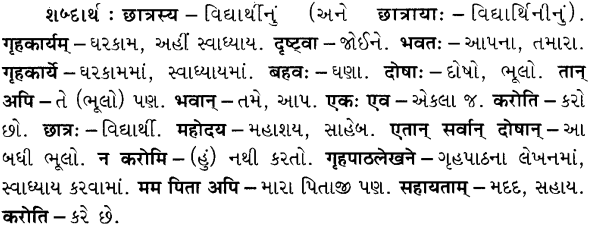
અનુવાદઃ
શિક્ષક – (વિદ્યાર્થીનું ગૃહકાર્ય જોઈને) તમારા ગૃહકાર્યમાં ઘણી ભૂલો છે. તે (ભૂલો) પણ તમે એકલા જ કરો છો.
વિદ્યાર્થી – સાહેબ! આ બધી ભૂલો હું એકલો જ કરતો નથી. ગૃહપાઠના લેખનમાં (ગૃહકાર્ય કરવામાં) મારા પિતાજી પણ મદદ કરે છે.

ચિત્ર 3
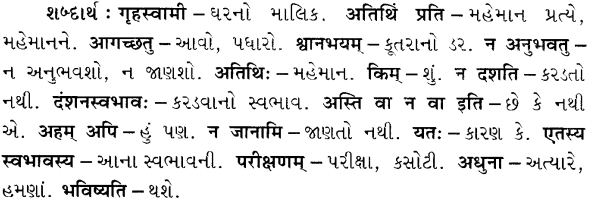
અનુવાદઃ
ઘરનો માલિક – (મહેમાન તરફ) આપ પધારો. કૂતરાનો ભય ન રાખો.
મહેમાન – શું તે કરડતો નથી?
ઘરનો માલિક – તેનો કરડવાનો સ્વભાવ છે કે નહિ એ હું પણ જાણતો નથી, કારણ કે એના સ્વભાવની પરીક્ષા હવે થશે.

ચિત્ર 4
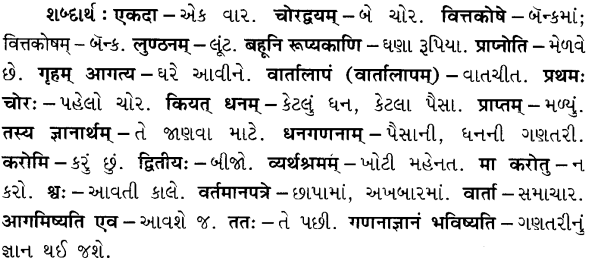
અનુવાદઃ
એક વાર બે ચોર બૅન્ક લૂંટે છે. ઘણા રૂપિયા મેળવે છે. ઘરે આવીને (તે) વાતચીત કરે છે.
પહેલો ચોર – કેટલા પૈસા મળ્યા તે જાણવા માટે પૈસાની ગણતરી કરું છું.
બીજો ચોર – ખોટી મહેનત ન કરો. આવતી કાલે છાપામાં સમાચાર આવશે જ. પછી ગણતરીની જાણ થશે.

ચિત્ર 5

અનુવાદઃ
વૃદ્ધ શંભુનાથ – મારી પત્ની મારા જમ્યા પછી જ ભોજન કરે છે.
રમાનાથ – શું તમે પત્ની સાથે ભોજન નથી કરતા કે?
શંભુનાથ – તેવું કંઈ જ નથી. મારા જમ્યા પછી તે ભોજન કરે છે, તેનું કારણ છે. કેમ કે, અમારા બંનેનું એક જ કૃત્રિમ દાંતનું ચોકઠું છે.